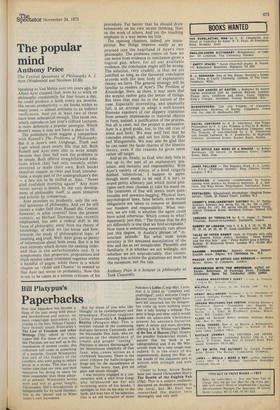The popular mind
Anthony Price
The Central Questions of Philosophy A. J. Ayer (Weidenfeld and Nicolson £3.50)
Speaking to Ved Mehta over ten years ago, Sir Alfred Ayer claimed that, were he to work on philosophy consistently for four hours a day, he could produce a book every six months. His recent productivity — six books within so many years — almost amounts to an indirect verification. And yet at least two of these have been substantial enough. This latest one, which reproduces last year's Gifford Lectures, is more definitely a popular parergon. Which doesn't mean it may not have a place to fill.
The publishers even suggest a comparison with Russell's The Problems of Philosophy. But it is Ayer's own Language, Truth and Logic which more nearly fills that bill. Both Russell and Ayer were able to write simply because they then half took the problems to be simple. Both offered straightforward solutions which they had only recently either invented or made their own. Both books therefore remain, as clear and fresh introductions, a staple part of the undergraduate's diet
— a fate not to be sniffed at. Alas, "Never glad confident morning again! " Any more recent survey is bound, by the very develop ment of philosophy itself, to seem tentative and eclectic by comparison.
Ayer promises us, prudently, only the central questions of philosophy. And yet he still covers a wider field than Russell did. Central, however, in what context? Now the present century, as Michael Dummett has recently emphasised, has seen a radical shift in the focus of philosophy, away from the theory of knowledge, of what we can know and how, towards the study of philosophical logic, of meaning an4 truth. Well, Ayer gives us plenty of information about both areas. But it is his own interests which dictate the ranking order, and that is the unfashionable one. It is symptomatic that properties, propositions and truth receive token treatment together within a handful of pages, while there is a whole chapter on 'Order and Chance' to remind us that Ayer last wrote on probability. Now this is not to be taken as a serious criticism of his procedure. Far better that he should draw txtensively on his own recent thinking, than on the work of others. And yet the resulting emphasis in a way belies his title.
The opening chapters, indeed, are inauspicious. But things improve vastly as we proceed into the heartland of Ayer's own philosophy. The problems centre on how we can move from evidence to conclusion given a logical gap, when, for all our available evidence, the conclusion might still be wrong.
The solution, very crudely, is that we are justified so long as the favoured conclusion accords with the best body of explanatory theory we have. The general strategy will be
familiar to readers of Ayer's The Problem of Knowledge. Here, as there, it may seem that
the sceptic rather gets the better of things.
But then that may lie in the nature of the case. Especially interesting, and unusually full, is an attempt to adapt a well-known Humean exposure of our slippery transition from sensory impressions to material objects to form, instead, a justification of the process.
Not all is clear, but the project is persuasive. Ayer is a good guide, too, to the old crux of mind and body. We may well feel that he concedes enough, and not too little, to Ryle and Wittgenstein. We may also be glad that he can resist the facile charms of the identity theory, even if the reasons he gives seem rather off target.
And so on, finally, to God, who duly fails to live up to the part of an explanatory pos tulate, and morality and responsibility. With
Ayer's variety of ethics, of a kind vulgarly dubbed 'subjectivist,' I happen to agree, though more needs to be said if it isn't to sound pretty arbitrary just which moral principles each man chooses to take his stand on. The treatment of free will seems more ques-1
tionable and question-begging. Physical laws. psychological laws, false beliefs, even moral obligations are taken to remove or diminish our freedom and responsibility. What mat ters, we are told, is whether the agent could have acted otherwise. Which comes to what? Apparently just this: "The fiction that he did act differently is one that we find acceptable."
Now there is something essentially rum about just this degree. in Austin's phrase, of "insouciant latitude." But what most needs scrutiny is the assumed assimilation of the free and the as yet inexplicable. Plausibly and familiarly, it is whether we act willingly, not .whether we act unpredictably, that counts. Among free actions the gratuitous act must be the exception, not the rule.
Anthony Price is a lecturer in philosophy at York University.


































 Previous page
Previous page